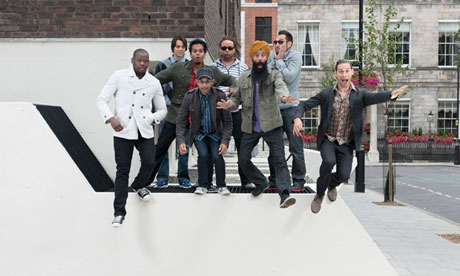
'We go hard," says MiWi La Lupa. "We have two hours' sleep, we hit that stage, and afterwards we don't go to bed – we play it hard." The bass trumpet player of Red Baraat is trying to explain the punk spirit behind the nine-piece New York band, which has just been performing on Radio 4's Loose Ends. Broadcasting House isn't exactly CBGB, but they do get an invite to the pub from host Clive Anderson, who has been bopping (in his chair) to their new track Shruggy Ji.
On paper, Red Baraat seem faintly ridiculous: a blend of jazz, funk, salsa and bhangra led by diminutive dhol-player Sunny Jain, 37, who shares the stage with six brass musicians and another two percussionists. But live, banging out their high-octane fusion of all of the above, they're irresistible: serial party-starters who have drawn all the usual cliches reserved for south Asian culture ("vibrant", "colourful", "spicy") but still manage to have crossover appeal. So far this year, they have toured Austria, played the Bonnaroo festival in Tennessee (America's Glastonbury), and released the album Chaal Baby ("an unstoppable blend of Bollywood hijacks and funk," according to the Village Voice). In April, they even found themselves performing at the White House.
"That was a blast," says La Lupa. "Bringing this noise to the American Indian treaty room – no treaties were signed!" Although the band, who this weekend play Bestival and the Paralympics closing ceremony, didn't meet the president, they did get to drink his beer.
For Jain, the White House gig was confirmation of how far he has come from his upbringing in a Punjabi household in upstate New York. "Being Indian, a strict vegetarian and into jazz," he says, "I was marginalised a lot growing up. I didn't really understand the ramifications of kids throwing smoke bombs in our yard, painting 'fucker' on the house, or calling my grandfather 'pyjama man'." It wasn't until college that the anger spilled out. "Every ethnicity had their college society and it was incredibly segregated. I got every kind of racist remark, with people not knowing if I was black, Latino, Asian. A Caucasian woman I dated was called a nigger-lover."
Jain's dad was a research scientist at Rutgers University in New Jersey, where Jain eventually enrolled to study jazz performance. "I fell heavily in love with jazz at 11 and knew at 16 that I was doing this for the rest of my life." If this came as a shock to his conservative immigrant parents, who hoped he would become a lawyer, they took it well. "I'd practise my drums for hours every night and they never asked me to stop. And they drove me to every concert I played: they were at every show. "
As a highly regarded jazz drummer, Jain worked with the likes of Peter Gabriel, David Byrne and St Vincent, and was used to being out of the spotlight at the back of the stage, knocking out his complex drum patterns. But with Red Baraat, he is every inch the bombastic frontman, having taught himself – via YouTube – to play the dhol, a barrel-like Punjabi drum that is slung over a shoulder and spanked with bamboo sticks. "It's a primal beat," he says. "I'm a completely different musician with it."
Red Baraat came together when Jain went looking for musicians to play his own wedding a few years ago (the band's name means "red wedding procession"). After the set at Broadcasting House, the band shoot off to play some other gigs, including one in Edinburgh. Then they're back in London, performing to 250 people – ranging from local Bangladeshi kids to City boys and middle-aged world music fans – at the arts centre Rich Mix. It's only a Monday night, but everyone's up on their feet with the very first song.
"For me," says Jain, "music has become a way of reconciling being an American and an Indian. I feel I've intertwined the two." He now wants to take Red Baraat back to where their sound began – India – where wedding musicians are not so highly regarded. "We're just waiting on an invite," he says. "I want to blow their socks off."

